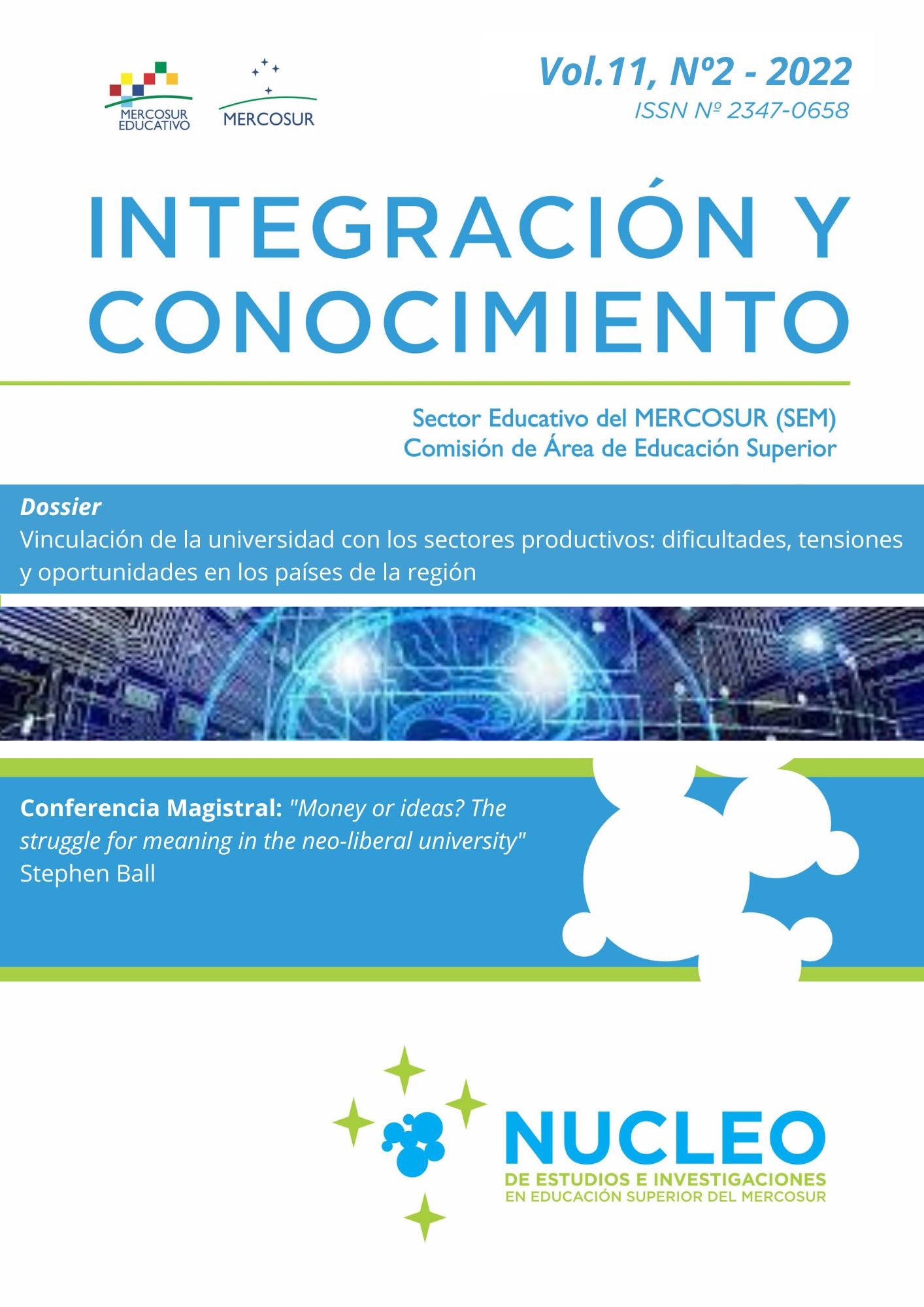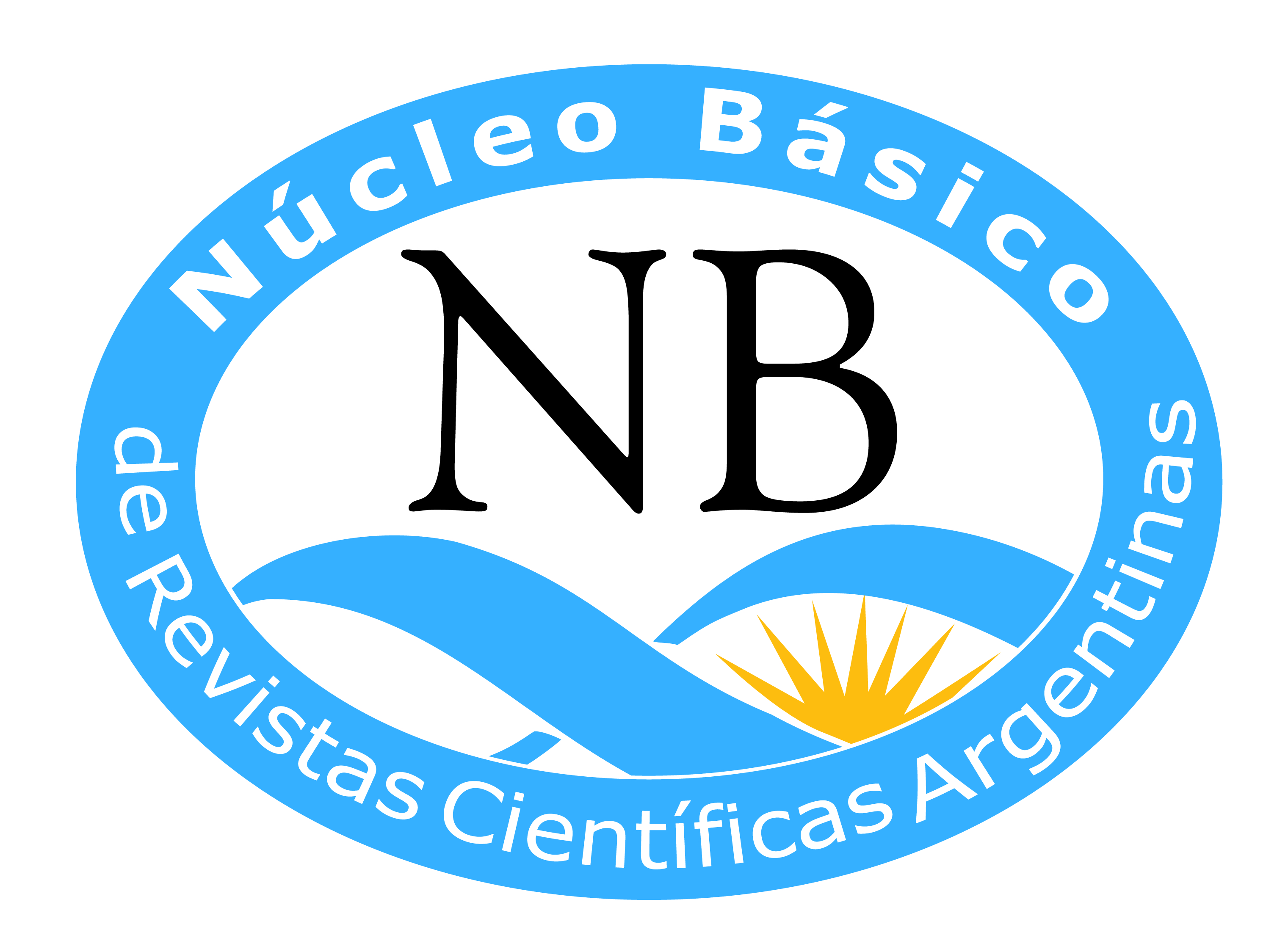Linking Universities-Productive Sectors, Change of Epoch and Contemporary Society
DOI:
https://doi.org/10.61203/2347-0658.v11.n2.38430Keywords:
linkage, universities, productive sectorsAbstract
Since the configuration of capitalism under the modality of the economy of innovation and knowledge in the period of the seventies of the last century, the relationship between universities and capitalist enterprises has become a basic component of the knitting of social relations in contemporary society. The hypothesis of this work is that these university-business relationships have been one of the central factors in the development of new modes of generation, circulation and application of contemporary social knowledge, which has had a decisive impact on the evolution of the role of universities in society. This has operated under the tensions that are generated in these relations between the university and the business actor, due to the different determinants with which these actors assume the development of knowledge. But the most significant thing for our hypothesis is that this dynamic of knowledge in the relationship between universities and entrepreneurs together with the new technological revolutions has contributed to the general evolution of the role of knowledge in collective life, now characterized as “the knowledge society”. This is particularly significant in the current historical period that has been identified in the literature as “Change of time” for humanity. This is due to various phenomena of great social relevance among which we unleash the ongoing transition from the knowledge society to the digital society and sustainable development, in which universities must participate with knowledge proposals for the benefit of society as a whole.
Downloads
References
Abreu, M., Grinevich, V., Huges, A. y Kitson, M. (2009). Knowledge exchange between the academics and the business, public and third sectors, UK-IRC, University of Cambridge and Imperial College London. Recuperado de https://eprints.soton.ac.uk/357117/1/AcademicSurveyReport.pdf
Adler, P.S. y Hekescher, C. (2006). The Firm as a Collaborative Community: The Reconstruction of Trust in the Knowledge Economy. 1st Edición, Oxford Press.
Alekseeva, A. (2014). Evolution of the Innovation Process Models. International Journal of Econometrics and Financial Management. 2 (4), 119-123. Recuperado de http://www.sciepub.com/ijefm/abstract/2643
Bell, D. (1976). El advenimiento de la sociedad post-industrial. España: Alianza. Recuperado de https://biblioteca.multiversidadreal.com/BB/Biblio/Daniel%20Bell/El%20advenimiento%20de%20la%20sociedad%20post%20%281252%29/El%20advenimiento%20de%20la%20sociedad%20-%20Daniel%20Bell.pdf
Benkler, Y. (2006). The wealth of networks. How Social Production Transforms Markets and Freedom. New Haven and London: Yale University Press.
Bush, V. (1945). Science: The Endless Frontier. National Science Foundation, 75th Anniversary Edition, Washington.
Recuperado de https://www.nsf.gov/od/lpa/nsf50/vbush1945.htm
Carayannis, E., Barth, T., y Campbell, D. (2012). The Quintuple Helix innovation model: global warming as a challenge and driver for innovation. Journal of Innovation and Entrepreneurship,1 (2), 1-12. Recuperado de: https://innovation
Davey, T., Galan, V. y Meerman, A. (2011). The State of European University-Business Cooperation, Final Report - Study on the cooperation between Higher Education Institutions and public and private organizations in Europe, Science to Business Research Centre. Germany: Munster University of Applied Science.
Recuperado de https://www.ub-cooperation.eu/pdf/final_report2017.pdf
Duncan, O. (1961). From social system to Ecosystem. Sociological Inquiry 31 issue 2, Wiley
Drucker, P. (1992). The age of discontinuity. Routledge.
Etzkowitz, H.; Webster, A. y Healey, P. (Eds) (1997). Capitalizing Kowledge New Intersections of Industry and Academia. New York:SUNY Press.
Etzkowitz, H.; Webster, A.; Gerbardt, C.; Cantisano Terra, B. (2000). The future of the university and the university of the future: evolution of ivory tower to entrepreneurial paradigm. Research Policy 29 (2), 313-330.
Etzkowitz, H.; Ledsdorff, L. (2000). The Dynamics of Innovation: From National Systems and 'Mode 2' to a Triple Helix of University-Industry-Government Relations. Research Policy, 29(2), 109-123. Recuperado de http://www.oni.uerj.br/media/downloads/1-s2.0-S0048733399000554-main.pdf
Fernández de Lucio, I. (2015). Mitos y realidades de la vinculación universidades –ES, (Ingenio- UPV). Ponencia presentada en el Tercer Congreso de la Red Universidad-Empresa ALCUE Buenos Aires 20 al 25 de octubre. Recuperado de http://tercercongreso.redue-alcue.org/ponencias/
Freeman, C. y Soete, L. (1997). The economics of industrial innovation. MIT Press, Mass.
Galafassi, G. (2004). Razón instrumental, dominación de la naturaleza y modernidad: la teoría crítica de Max Horkheimer y Theodor Adorno. Theomai, n° 9, primer semestre. Buenos Aires: Red Internacional de Estudios sobre Sociedad, Naturaleza y Desarrollo. Recuperado de https://www.redalyc.org/pdf/124/12400905.pdf
Garrido, C. y García, D. (2016). Vinculación de las universidades con sectores productivos. Casos en Latinoamérica. México: Editorial UDUAL. Recuperado de: https://www.redue-alcue.org/website/librocasos.php
Garrido, C. (Coord.) (2021). Las universidades y la transición hacia la sociedad digital en América Latina y El Caribe. Reflexiones y propuestas estratégicas. En Cuadernos de Universidades. No. 12. UDUAL. Recuperado de https://www.udual.org/principal/wp-content/uploads/2021/05/Las-Universidades-y-la-Transicion-Digital.pdf
Gibbons, M.; Limoges, C.; Nowotny, H.; Schwartzman S.; Scott, P.; y Trow, M. (1994). La nueva producción de conocimiento. La dinámica de la ciencia y la investigación en las sociedades contemporáneas. Barcelona: Ediciones Pomares. Recuperado de https://www.ses.unam.mx/docencia/2007II/Lecturas/Mod1_Gibbons.pdf.
Godin, B. (2006). The Linear Model of Innovation. The Historical Construction of an Analytical Framework. Science, Technology, & Human Values, 31, (6), pp. 639-667. Recuperado de https://journals.sagepub.com/doi/10.1177/0162243906291865
Heilbroner, R. (1996). ¿Son las máquinas el motor de la historia? En Leo Marx y Merritt Roe Smith (eds). Historia y determinismo tecnológico, Madrid: Alianza.
Hughes, A. (2007a). Innovation policy as cargo cult: Myth and reality in knowledge- led productivity growth. Centre for Business Research, Working Paper No. 348 University of Cambridge. Recuperado de https://www.cbr.cam.ac.uk/wp-content/uploads/2020/08/wp348.pdf
Hughes, A. (2007b). University-Industry linkages and UK science and innovation policy. IT Working Paper Series 07-24, CBR-ITEC, University of Cambridge.
Hughes, A. y Kitson, M. (2013). Connecting with Ivory Tower: Business perspectives of knowledge exchange. In the UK. UK-IRC: University of Cambridge and Imperial College London. Recuperado de https://www.academia.edu/18089088/Connecting_with_the_ivory_tower_business_perspectives_on_knowledge_exchange_in_the_UK
Johnson, B. y Lundvall, B. (1994). Sistemas Nacionales de Innovación y Aprendizaje institucional. Revista Comercio Exterior, 44(8), 695-704. Recuperado de http://revistas.bancomext.gob.mx/rce/magazines/362/4/RCE4.pdf
Kitson, M. et al (2009). University-Industry Knowledge Exchange: Demand Pull, Supply Push and the Public Space Role of Higher Education Institution: Full Research Report. ESRC End of Award Report, RES-171-25-0018. Swindon: ESRC. Recuperado de https://michaelkitson.files.wordpress.com/2013/02/university-knowledge-exchange-report.pdf
Kline, S. y Rosemberg, N. (1986). An overview on innovation, in “Studies on Science and the Innovation Process. Selected Works of Nathan Rosenberg” (2009), University of Stanford.
Recuperado de https://www.semanticscholar.org/paper/An-Overview-of-Innovation-Kline-Rosenberg/35f0d8e97eddbc98dacd626e265d63770905b95f
Leydesdorff, L. y Meyer, M. (2013). Transferencia de tecnología y fin del efecto Bayh-Dole: Las patentes como lente analítica en las relaciones universidad-industria-gobierno. Recuperado de https://www.researchgate.net/publication/235656742_Technology_Transfer_and_the_End_of_the_Bayh-Dole_Effect_Patents_as_anAnalytical_Lens_on_University-Industry Government_Relations
Mateja, M., Pusnik, T., y Pavlin, S. (2014). Emerging modes of cooperation between private enterprises and universities. Insight of European Enterprises and employers organizations, EMCOSU project. Recuperado de https://www.wbltoolkit.eu/fileadmin/user_upload/wbl2_epb1_ep13_3_intreport_en.pdf
Meyer, U. y Schubert, C. (2007). Integrating path dependency and path creation in a general understanding of path constitution. The role of agency and institutions in the stabilisation of technological innovations. Science, Technology & Innovation Studies, 3, 23-44
Moore, J. (1993). Predators and prey: a new ecology of competition. Harvard Business Review, 71, 75-86.
Nelson, R. (1995). Recent Evolutionary Theorizing About Economic Change. Journal of Economic Literature, Vol. XXXIII, pp. 48-90. Recuperado de: http://ebour.com.ar/ensayos_meyde/Richard%20R.%20Nelson%20-%20Teorizacion%20evolutiva%20reciente%20sobre%
Cambio%20Economico.pdf
Nonaka, I., y Takeuchi, H (1995). The knowledge creating company: how Japanese companies create the dynamics of innovation. Oxford University Press, New York.
Nuchera, A., León, G., y Pavón, J. (2002). La gestión de la innovación y la tecnología en las organizaciones. Editorial: Pirámide. Madrid.
OCDE (2007). Manual de Oslo. OCDE. Recuperado de https://www.oecd-ilibrary.org/science-and-technology/manual-de-oslo_9789264065659-es
Olive, L. (2007). La ciencia y la tecnología en la sociedad del conocimiento. Ética, política epistemología. México: Fondo de Cultura Económica
Ranga, M., Hoareau, C., Durazzi, N. y Etzcowitz, H. (2013). Study on University-Business Cooperation in the US. London: London School of Economics.
Schumpeter, J. (1934). The theory of economic development. Harvard University Press.
So, A., Sampat, B., Rai, A., Cook-Deegan, R., Reichman, J., Weissman, R., y Kapczynski, A. (2008). Is Bayh-Dole good for developing countries? Lessons from the US experience. PLoS Biol 6(10): e262. doi:10.1371/ journal.pbio.0060262. Recuperado de https://journals.plos.org/plosbiology/article?id=10.1371/journal.pbio.0060262
Sriniva, S., y Viljamaa, K. (2006). Economic institutionalization in practice: Development and the “third role” of universities. MIT-IPC-LIS-05-002, Industrial Performance Centre, MIT. Recuperado de https://web.mit.edu/lis/papers/LIS05-002.pdf
Tiffin, J.; Rajasingham, L. (2009). The global virtual university. Routledge Falmer.
Touraine, A. (1969). La sociedad post-industrial. España: Ariel.
Unesco (2005). Hacia la sociedad del conocimiento, Unesco. Recuperado de https://unesdoc.unesco.org/ark:/48223/pf0000141908
Velazco E.; Zamanillo, I. y Gurutze, M. (2007). Evolución de los modelos sobre el proceso de innovación desde el modelo lineal hasta los sistemas de innovación. XX Congreso Anual de la AEDEM. Recuperado de https://dialnet.unirioja.es/servlet/articulo?codigo=2499438
Whitehead, A. (1925). Science and the Modern World. New York: Macmillan Company
Downloads
Published
How to Cite
Issue
Section
License

This work is licensed under a Creative Commons Attribution-NonCommercial-ShareAlike 4.0 International License.
Authors who have publications with this journal accept the following terms:
a. Authors shall retain their copyright and guarantee the journal the right of first publication of their work, which shall simultaneously be subject to the Creative Commons License of Recognition which allows third parties to share the work as long as its author is indicated and its first publication is this journal.
b. Authors may adopt other non-exclusive licensing agreements for the distribution of the published version of the work (e.g., depositing it in an institutional telematic archive or publishing it in a monographic volume) provided that the initial publication in this journal is indicated.
c. Authors are allowed and encouraged to disseminate their work via the Internet (e.g. in institutional telematic archives or on their website) after publication of the article, which may lead to interesting exchanges and increased citations of the published work. (See The Effect of Open Access).



